I’ve spent most of my life around sheep, but Arabi Sheep truly stand out. These fat-rumped, hardy animals are not only easy to manage but also incredibly adaptable. Whether you’re farming in dry, hot areas or cooler coastal regions, they thrive in both extremes. Their strong build, unique wool, and calm nature make them a top pick for farmers, breeders, and even hobbyists. In this guide, I’ll share everything I’ve learned—from their history and traits to feeding, health, and hands-on farming tips. If you’re after a tough, dual-purpose breed, Arabi Sheep are worth your time.
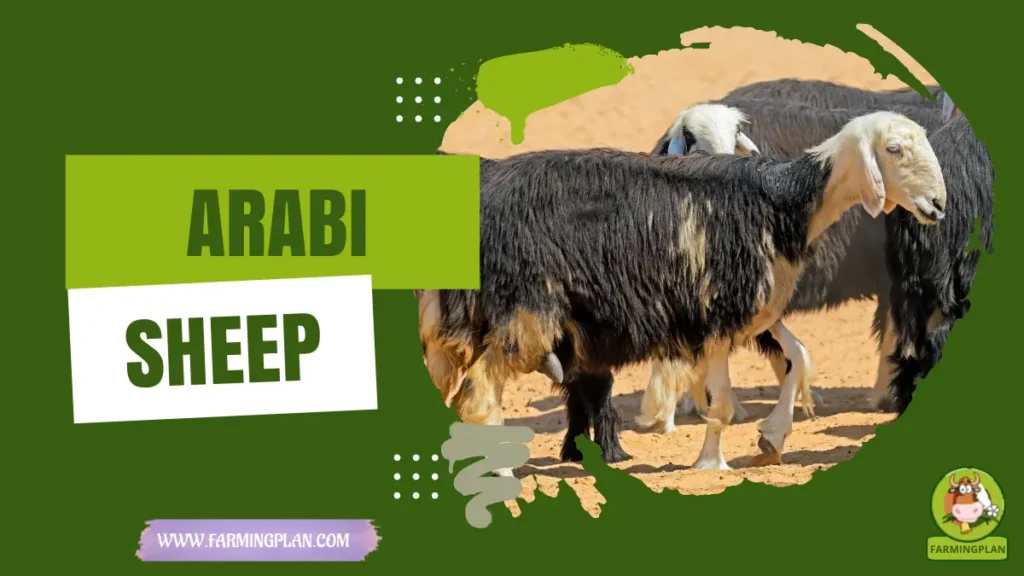
History & Origin Of Arabi Sheep
The story of Arabi Sheep is a tale that stretches back through the annals of time, long before modern farming techniques. They trace their roots to the Arabian Peninsula, journeying through the narrow Bal-el-Mandeb Straits into what’s now Iran, Iraq, and parts of Africa. You’ll often hear them mentioned alongside Afghan Arabi sheep, Balkhi sheep, and Alai sheep, all of which share certain traits, especially the prominent fat rump. Their historical significance is not just a matter of the past, but a living connection to the rich heritage of sheep farming.
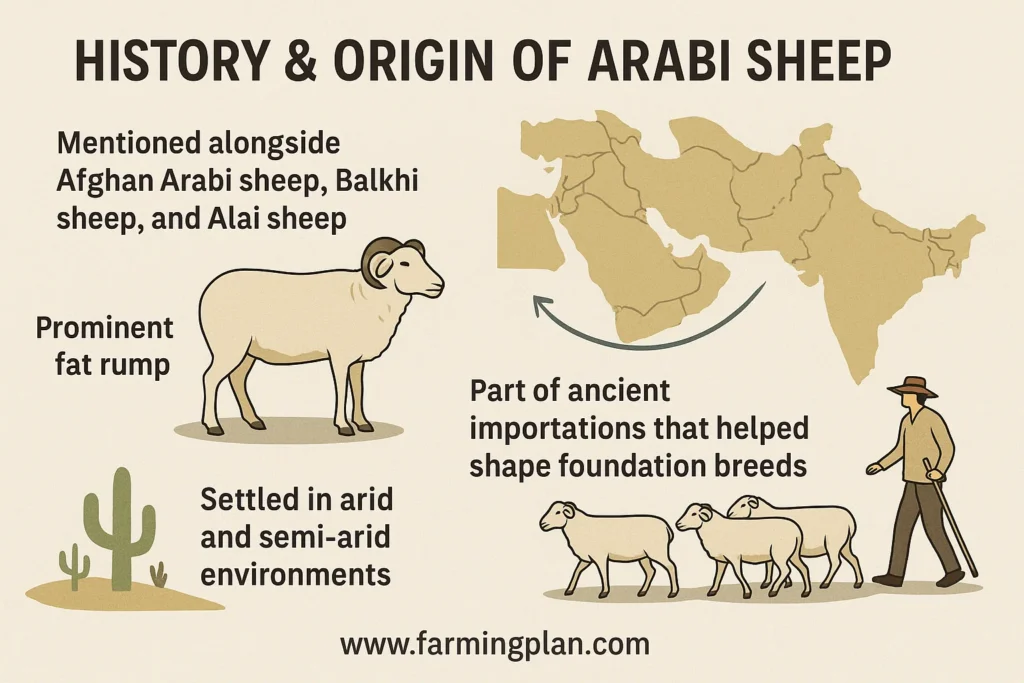
These sheep weren’t just wanderers; they were part of ancient importations that helped shape today’s foundation breeds. Back then, farmers weren’t just looking for meat or wool—they needed animals that could survive harsh environments. And that’s exactly what the Arabi delivered. Over time, they settled in arid and semi-arid environments, adapting perfectly to places where other livestock just couldn’t thrive. Their role in these importations and their ability to thrive in such conditions make them a significant and resilient breed.
Read More: Afghan Arabi Sheep: Strong, Hardy & Valuable
Characteristics Of Arabi Sheep
One glance at an Arabi sheep and you’ll spot the standout feature right away: the fat rump. It’s not just there for show—it’s actually a natural energy reserve that helps them survive in dry regions with limited food. That’s what makes them part of the fat-rumped breed group. Their average height is moderate, making them easy to manage, and they often have a white coat that blends in beautifully with desert or scrubland surroundings.
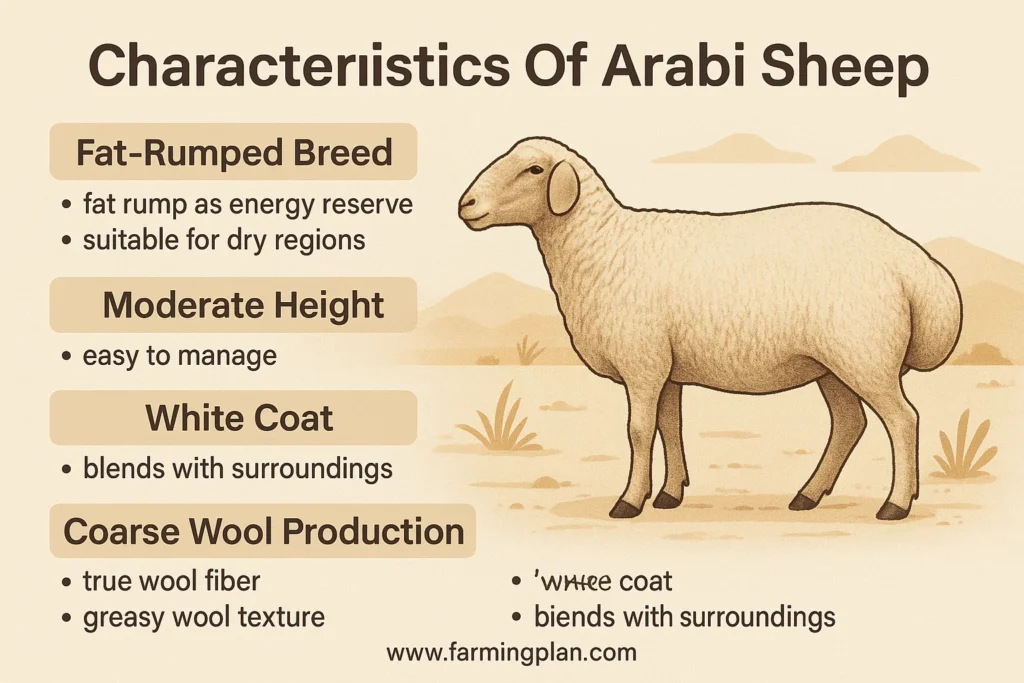
Now let’s talk wool. These sheep produce a coarse type of fleece, which includes true wool fiber and wool fiber bundles. While it might not be the softest fleece out there, it’s durable and valuable for wool production, especially in regions where wool characteristics are prioritized over luxury feel. The fleece has a greasy wool texture, and when properly sheared and cleaned, it’s quite strong. You’ll also find high levels of wool wax, which plays a part in protecting the fibers and the sheep’s skin from extreme temperatures. This unique wool production is a testament to the value of Arabi Sheep in the farming world.
Read More: Jacob Sheep: Discover the Unique Benefits of Raising
Temperament & Nature Of Arabi Sheep
Here’s the best part—they’ve got personality. Arabi Sheep are generally calm and cooperative. I’ve worked with all kinds of sheep, but the Arabi is among the easiest to manage. They’re not jumpy or overly aggressive, even the rams tend to be well-mannered. That makes them perfect for both experienced farmers and newcomers just getting started.
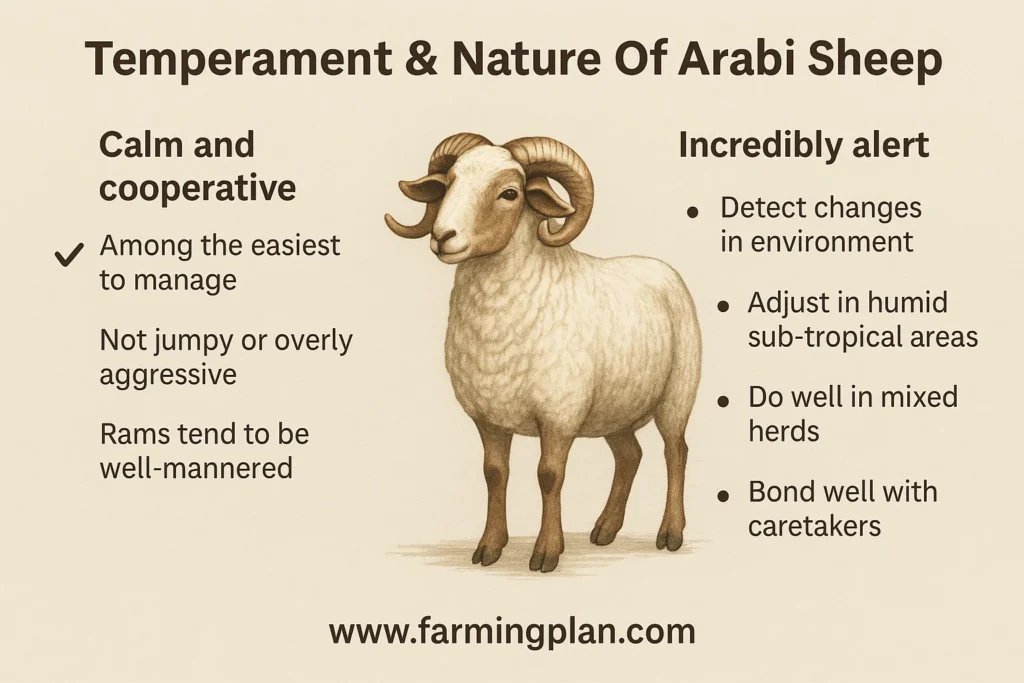
They’re also incredibly alert. It’s like they’ve got a sixth sense when it comes to detecting changes in their environment, especially in humid sub-tropical environments where moisture can mess with their comfort. But they rarely panic. They simply adjust. I’ve noticed they do well in mixed herds, too. They don’t mind sharing space with other breeds, and they seem to bond well with caretakers—especially if you spend a little time with them daily. So, if you’re someone who loves animals and values good behavior in livestock, Arabi sheep won’t disappoint.
Read More: Rambouillet Sheep : Secrets From Wool to Meat Excellence
Food & Diet Plan
Feeding Arabi Sheep is more straightforward than you might think. These animals are browsers by nature, so they love to nibble on shrubs, dry grasses, and even tree leaves. But to get the best out of them—especially for meat and wool production—you’ve got to supplement their natural diet.
I usually feed mine a mix of straw, grain-based feed, and clean water. You can throw in alfalfa, barley, and some molasses on occasion. They don’t need super fancy nutrition plans, but consistency is key. Keep their meals balanced, and their sheep tail fat will store energy efficiently for those lean months. A balanced diet that includes a mix of these elements ensures that the sheep get the necessary nutrients for their growth and production.
Now, what should you avoid? Don’t overfeed corn or high-starch feeds—they can mess with their digestion. Also, avoid wet or moldy feed; these sheep do best on dry, clean forage. A mineral lick block is a good addition too—it keeps their system in balance, especially when temperatures start swinging.
Usage & Purpose Of Arabi Sheep
The Arabi sheep isn’t just a pretty face with a fat rump. These animals are dual-purpose, making them ideal for wool and meat farming. Their coarse wool is highly valued in certain textile markets, especially in traditional weaving where durability trumps softness.
But if you’re into meat production, these sheep shine there too. Thanks to their meaty build, particularly around the hindquarters, they’re a solid choice for local and regional meat markets. And because they’re a fat-rumped breed, you get the added bonus of Dumba animal characteristics—high fat reserves that are prized in many traditional dishes across the Middle East and Central Asia. I’ve sold Arabi lambs to both breeders and meat processors, and let me tell you—they move fast. Their economical traits make them perfect for scaling up a small operation or adding variety to an established farm.
Special Traits That Make Arabi Sheep Stand Out
Let’s talk about what makes these sheep really special. First off, their fat-rumped anatomy isn’t just unique—it’s functional. In harsh, arid environments, it works like a built-in energy pack. When feed gets low, they metabolize that fat for survival.
Then there’s their wool. It might not win awards for softness, but its strength of wool fiber, true wool percentage, and diameter of wool make it a top choice for certain types of durable textiles. In fact, researchers are actively doing evaluation on wool characteristics, including greasy wool yield, wool per shearing, and wool cha-racteristics to better understand and improve fleece quality. Add in their resistance to disease, ability to cope with environmental factors, and natural adaptability to humid sub-tropical environments, and you’ve got a breed that’s as tough as it is useful.
Fat-Rumped And Full Of Grit, Arabi Sheep Thrive Where Others Quit.
Health Issues & Preventive Care
No animal is 100% bulletproof, but Arabi Sheep come pretty close. Still, there are some health things you should watch for. The fat rump, while helpful, can lead to overheating in warmer months if you don’t shear them properly. That’s why wool shearing time matters—usually every 4 to 6 months.
Parasites are another common issue. Regular deworming and hoof care go a long way in keeping them healthy. I also recommend checking their wool fiber bundles and skin during grooming for any signs of lice or fungus. Clean bedding, dry pastures, and well-ventilated shelters help prevent most problems. Vaccinations? Absolutely. Consult with your local vet about region-specific vaccines. It’s also smart to maintain a wool laboratory log—track shearing dates, health checks, and feed schedules. That little bit of record-keeping makes all the difference when you’re running a busy operation.
Step-By-Step Arabi Sheep Farming Guide
Raising Arabi Sheep isn’t just about feeding and waiting—it’s about knowing what to do and when to do it. Over the years, I’ve fine-tuned a step-by-step routine that works in real farm conditions, whether you’re managing one sheep or a whole flock. Let me walk you through the process so you can raise healthy, productive Arabi Sheep from day one.
Step 1: Choose The Right Stock
Start with healthy, purebred Arabi sheep. Look for strong limbs, bright eyes, and well-formed fat rumps. Always buy from a trusted breeder or livestock market with a reputation for quality. A good foundation ensures your flock stays healthy and productive. It’s also wise to ask for health history, shearing schedules, and feed records. This info helps you prepare your setup accordingly and plan their routine from day one.
Step 2: Build A Comfortable Shelter
Your sheep need protection from the sun, wind, and cold. Set up a clean, shaded shelter with open sides for airflow during hot months. In colder regions, provide a dry enclosed area with thick bedding. Keep your shelter clean and dry. Moisture is the enemy—it breeds parasites and hoof rot. I like to use sand or dry straw on the floor and clean it out weekly. A happy sheep is a productive sheep.
Step 3: Feed With Balance And Consistency
Stick to a feeding routine with hay, dry grass, and grain supplements. Add minerals and clean water daily. If you’re raising them for wool, high-fiber diets help maintain fleece quality. Be careful not to overfeed. Fat-rumped sheep can store too much tail fat, which affects mobility and reproduction. Keep portions consistent and observe how they respond.
Step 4: Schedule Regular Shearing
Arabi sheep do best with a trim every 4–6 months. Regular shearing helps prevent overheating, improves hygiene, and maintains fleece quality. Use clean, sharp shears and take your time—rushing only increases the risk of cuts. Keep records in your browser window or spreadsheet. Trust me, knowing when you last sheared makes managing the flock so much easier.
Step 5: Prevent Disease Proactively
Prevention beats treatment. Deworm your sheep on a set schedule, vaccinate as per vet advice, and monitor the flock daily. Look for odd behavior, limping, or skin issues. Invest in routine checkups and don’t ignore little signs. A cough, sluggishness, or sudden drop in feed intake? Get on it fast. The sooner you act, the easier (and cheaper) it is to treat.
Expert Tips & Best Practices
I always tell folks—keep an eye on that tail fat! It’s more than just a fluffy backside. For Arabi Sheep, it’s like a built-in energy reserve. When I notice it shrinking, that’s a clear sign the sheep may need more food or care. So, watching the tail fat regularly helps me catch issues before they get serious.
One of my favorite tricks is to shear early in the morning. Arabi Sheep don’t do too well with heat, especially during warmer months. Shearing them before the sun gets too high keeps them calm and stress-free. It also makes the whole process smoother for both me and the sheep. When it comes to feeding, I’ve found the best results by mixing local grasses with a bit of commercial feed. The local forage is easier on their stomach, and the added feed gives them a boost in nutrients. It’s all about balance, and this combo keeps their digestion running smoothly.
I also track everything with a mobile farming app—wool yields, shearing schedules, even when they last got dewormed. It may sound high-tech, but trust me, it’s a game-changer. I used to jot things down on paper and always lost track. Now, I stay organized without the headache. And lastly, never forget the basics—clean water, all year long. Even during the winter, your sheep need fresh water daily. It keeps them hydrated, supports digestion, and even plays a role in healthy wool growth. Simple, but super important.
FAQs
What is the purpose of Arabi sheep?
They’re mainly raised for coarse wool and meat. The fat rump also makes them valuable in traditional meat markets.
Where are Arabi sheep originally from?
They originated in the Arabian Peninsula and spread through ancient trade into Iran, Iraq, and parts of Africa.
How often should I shear Arabi sheep?
You should shear them every 4–6 months to maintain wool quality and prevent overheating.
Are Arabi sheep easy to manage?
Yes, they have a calm temperament and adapt well to different environments, making them suitable for all experience levels.
What makes Arabi sheep wool different?
Their wool is coarse but durable, with high levels of wool wax and strong fiber structure, ideal for non-luxury textile production.
Conclusion
Raising Arabi Sheep has been one of the most rewarding parts of my farming journey. From their fascinating fat-rumped build to their resilience in tough climates, they bring a lot to the table for wool and meat production. Whether you’re a hobbyist with a small flock or a commercial farmer looking for a dependable breed, Arabi sheep offer the right mix of personality, performance, and practicality. Give them the right care, and they’ll give back more than you expect—every single season.

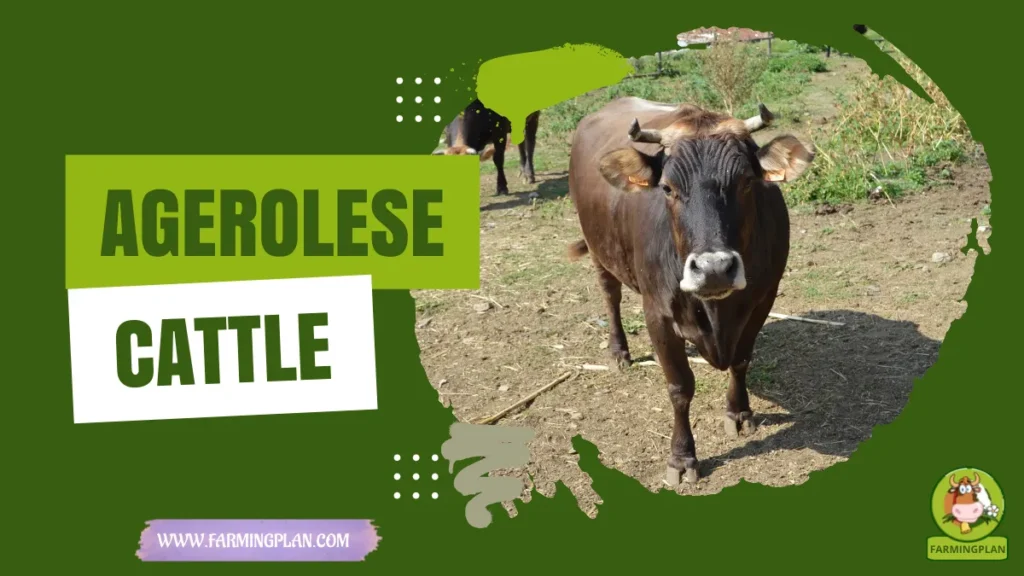
This is a very interesting and beautiful topic; I hope to stay in touch with you about it.